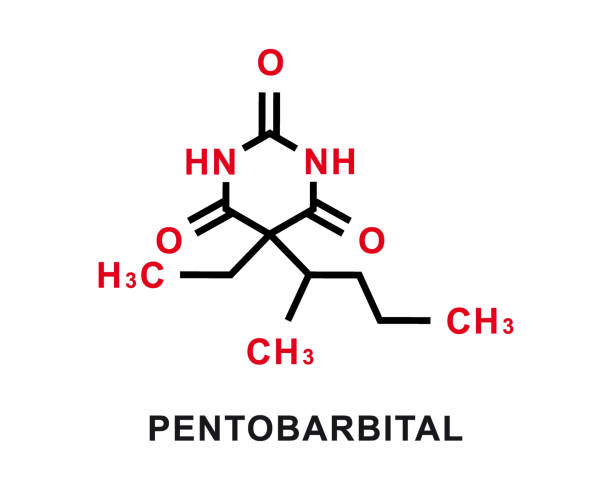What is Nembutal (pentobarbital)?
Nembutal pentobarbital is a brand name for pentobarbital, a short-to-intermediate acting barbiturate. Like other drugs in this class, pentobarbital depresses central nervous system activity by enhancing the inhibitory effects of the neurotransmitter GABA. Historically it was used widely as a sedative and sleep aid; today its clinical role is narrower and more specialized because safer alternatives (for example benzodiazepines) have largely replaced barbiturates for routine sedation and insomnia.
Accepted medical benefits and clinical indications
When used appropriately in medical settings, pentobarbital has a handful of important therapeutic uses:
- Emergency control of seizures / status epilepticus — At anesthetic doses, pentobarbital can be used to suppress refractory seizures when first-line agents fail; it has been used to induce medically-induced coma in life-threatening convulsive states.
- Pre-anesthetic and sedation — Pentobarbital has sedative and hypnotic properties and has been used to produce sedation before procedures or as a short-term hypnotic (sleep aid), though that use is now uncommon because of tolerance and safety concerns.
- Management of intracranial hypertension and refractory increased intracranial pressure — In critical care contexts, barbiturate coma (including pentobarbital) has been used as a last-resort therapy to lower intracranial pressure when other measures fail.
- Palliative and end-of-life care (selected contexts) — Pentobarbital and other barbiturates are sometimes included in palliative sedation protocols to relieve intractable agitation, refractory seizures, or severe distress in dying patients when other measures do not control symptoms; these uses are carefully managed by palliative teams. Clinical guidance emphasizes close monitoring, clear goals of care, and informed consent.
Those benefits are meaningful in acute and specialized settings — particularly where rapid, profound CNS depression is needed to control life-threatening phenomena. But because pentobarbital can depress breathing and cardiovascular function, its use requires trained clinicians, monitored environments, and clear indications.
Why pentobarbital is not a first-line or casual option
Although Nembutal pentobarbital can be effective, it carries substantial safety tradeoffs compared with newer agents:
- Narrower therapeutic index — The difference between an effective sedative dose and a dangerous, respiratory-depressing dose is smaller for barbiturates than for many modern sedatives. That raises overdose risk if used improperly.
- Tolerance and dependence — Barbiturates can cause tolerance (requiring higher doses) and physical dependence, with potentially severe withdrawal syndromes. For many outpatient indications (insomnia, anxiety), benzodiazepines and non-benzodiazepine hypnotics are preferred because they are generally safer in routine use.
- Respiratory and cardiovascular depression — At higher doses, pentobarbital significantly suppresses respiratory drive and can lower blood pressure and cardiac output; these effects require monitoring in controlled settings.
Because of these risks, clinical practice has moved toward more selective, lower-risk options for common problems such as anxiety or sleep disturbance; pentobarbital is reserved for situations where its particular pharmacologic profile is advantageous and where monitoring is available.
Pentobarbital and end-of-life / assisted-dying contexts — what’s public and what’s contentious
Pentobarbital is well known outside medicine for its role in veterinary euthanasia and for its use in some jurisdictions’ assisted-dying protocols (where legally permitted) because high oral doses reliably and rapidly suppress consciousness and vital functions. These non-routine uses have put pentobarbital in the spotlight for legal, ethical, and safety debates: regulators and clinicians emphasize that any use related to hastening death is governed by strict laws, protocols, and oversight where permitted — and is illegal and dangerous where it is not. News reports and case reviews have also highlighted illicit distribution and misuse (including importation through unregulated channels), which is a public-safety concern. I will not provide information that facilitates obtaining or using pentobarbital outside lawful medical practice.
Practical clinical considerations and monitoring
When pentobarbital is used medically, teams follow strict safeguards:
- Controlled administration and monitoring — Administration usually occurs in hospitals, intensive care units, or by specialized palliative teams with cardiorespiratory monitoring, because of the risk of respiratory depression and hemodynamic instability.
- Clear goals and consent — For palliative sedation, clinicians document goals (relief of refractory symptoms), obtain informed consent from the patient or surrogate, and reassess continuously. International guidance emphasizes proportionate dosing to relieve suffering while respecting ethical and legal boundaries.
- Interaction and contraindication awareness — Pentobarbital interacts with many drugs and can affect liver enzymes; it’s contraindicated or used with extreme caution in patients with respiratory depression, severe hepatic impairment, or certain medical conditions.
Regulatory status and availability
Pentobarbital is a controlled substance in most countries and subject to strict manufacturing, distribution, and prescribing rules. In many places its medical use has declined and veterinary formulations are more common; meanwhile regulators monitor illegal diversion and counterfeit products. Because of its control status and safety profile, questions about availability and legal access are handled through formal medical and regulatory channels.
Bottom line — where pentobarbital fits in modern medicine
Pentobarbital (Nembutal) remains a medically useful drug in specific, tightly controlled clinical niches: emergency seizure suppression, selected pre-anesthetic or ICU sedation strategies, reduction of refractory intracranial pressure, and carefully managed palliative sedation. Those therapeutic benefits are balanced by meaningful safety risks (respiratory and cardiovascular depression, tolerance/dependence, narrow therapeutic window), which is why its use today is limited to well-monitored settings and why newer, safer alternatives are preferred for many routine indications. Public and regulatory concerns about misuse, illicit importation, and non-medical uses further underscore why pentobarbital is tightly regulated and clinically supervised.


